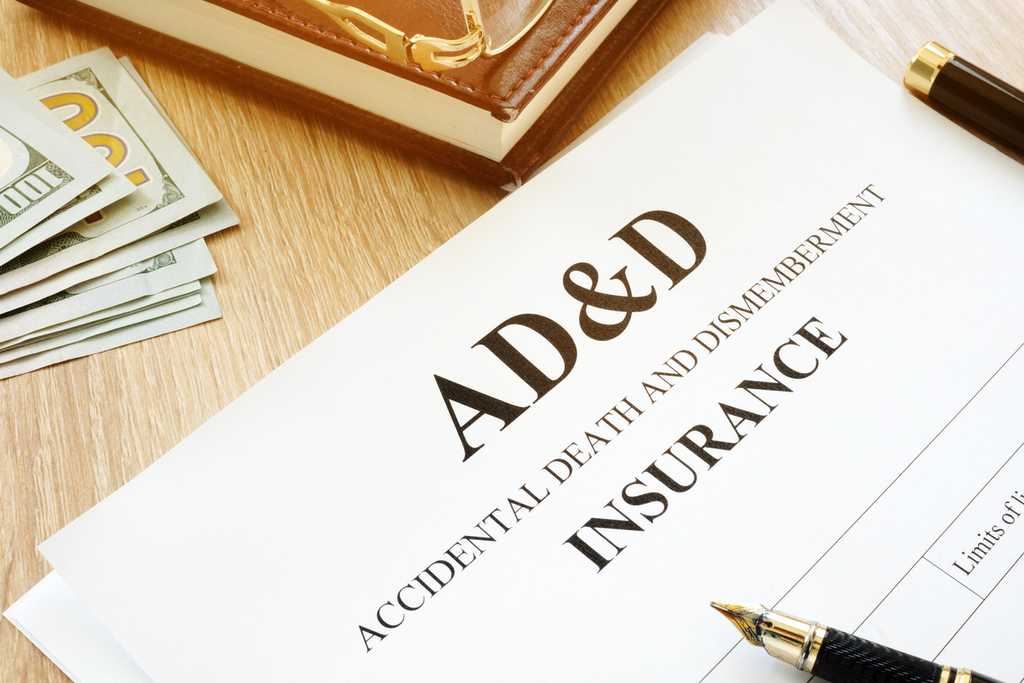Accidental death and dismemberment (AD&D) insurance pays a monetary benefit if — as the result of an accident — you die, lose a limb, or lose the use of a function such as your sight, hearing, or speech. AD&D can be purchased as a rider on a life insurance policy or as a standalone policy.
It might be tempting to consider AD&D as a substitute for life insurance. However, be aware that the coverage is somewhat limited. AD&D should therefore be considered not a substitute but a supplement to a standard life insurance policy.
What AD&D insurance covers
AD&D provides coverage for death and injuries caused by an accident. These might occur on the job, while traveling, or at home.
In an accidental death, your designated beneficiaries (for example, your spouse or children) would receive a lump-sum payment called a death benefit. The specific amount of the death benefit is determined when you purchase the policy — a higher death benefit will cost you more in premium.
If you’re injured and lose a limb, are permanently paralyzed, or lose the use of one of your faculties, you’ll receive a payment known as a living benefit. The limit of this benefit is also determined when you purchase the policy. Depending on the type of injury and the insurance company’s rules, your exact payout will be a percentage of that limit. For example, if an accident causes you to lose a hand, your living benefit may be 50% of the policy’s limit. If, however, you lose both a hand and your sight, you may receive 100% of the policy’s limit.
Note that if you add AD&D as a rider to a life insurance policy, the insurer may set the maximum benefit amount to the same level as the primary death benefit. So if you were to die in an accident, your beneficiaries would receive both the primary policy’s death benefit and the rider’s death benefit. This situation is known as double indemnity.
What AD&D insurance does not cover
It may seem tempting to consider AD&D as a substitute for a regular life insurance policy. However, it’s important to understand an AD&D policy’s limitations.
AD&D covers only accidental death. It will not pay if the death is due to natural causes, including heart disease, stroke, cancer, or complications from diabetes or other chronic diseases. While accidents are among the leading causes of death in the United States (and are the leading cause for Americans under age 44, according to the Centers for Disease Control), various natural causes are far more common overall.
The bottom line? It's essential to have a standard life insurance policy to keep your family financially secure if your death is related to a natural cause.
AD&D policies typically have long lists of exclusions as well. These are causes of death or dismemberment that, while accidental, are not covered. Exclusions may include things such as:
- Drug overdose
- Driving while under the influence of alcohol or drugs
- Activities such as car racing, piloting a plane, or participation in skydiving or other extreme sports
- Committing a crime
- Riot or war
- Serving in the military
- Suicide or self-inflicted injuries
Pros and cons of AD&D insurance
While AD&D offers some significant benefits, it may not be a wise purchase for every person. If you’re thinking about buying AD&D, consider these pros and cons.
Pros
- AD&D is easy to get, and it's inexpensive — Insurance companies usually approve coverage quickly, without a medical exam. Because coverage is limited, it's affordable.
- AD&D supplements a standard life insurance policy — A policy can give your family added financial protection beyond a standard term or whole life policy.
Cons
- AD&D coverage is limited — A policy provides benefits only for accidental death or injury. Natural causes such as heart attacks and strokes are not covered.
- You could lose employer-provided AD&D coverage if you leave your job — Many companies offer AD&D as an employee benefit. But be aware that if you leave your job, you may lose coverage and need to purchase it through another means.
- AD&D may provide a false sense of security — It could be easy to overestimate the financial security provided by an AD&D policy. Remember that it only applies to accidental situations. Take this into consideration when evaluating your overall life insurance portfolio.
Who should get AD&D insurance
The most obvious candidates for AD&D insurance are those in occupations with a high risk of injury or death.
According to the most recent data from the US Bureau of Labor Statistics, these occupations include commercial fishing, logging, commercial aircraft pilots and engineers*, and roofers and construction trades. Those whose work involves a lot of time on the road, including truck drivers and salespeople, are also on the list.
AD&D is also worth considering if you’re young and can’t afford regular life insurance. As noted earlier, accidents are the leading cause of death for those under the age of 44. AD&D can thus be a relatively inexpensive way to provide your family with added financial security. Remember that an AD&D policy is much more limited in coverage than a term or whole life insurance policy.
*Some AD&D policies exclude death or injury sustained while piloting a plane. However, commercial pilots can purchase a similar coverage called aviation accident insurance.
How to get AD&D insurance
AD&D is relatively easy to buy. Unlike most life insurance policies, AD&D doesn’t usually require a medical exam, and coverage is approved quickly by the insurance company. Because the coverage is more limited than what's available with a life insurance policy, it's relatively inexpensive. Remember that rates will vary by insurance company and amount of coverage.
If you’re considering AD&D, first check with your employer. Similar to health insurance, AD&D is offered by many companies as part of their benefits package — often at low or no cost to the employee. Another route is to check with your life insurance company. You may be able to add AD&D as a rider (an additional coverage) to your policy. Finally, you can shop for AD&D through several major insurance companies.
When considering an insurance purchase, it's a good idea to consult with an agent. They're licensed by the state and know the ins and outs of the coverage they sell. An agent can discuss your needs in detail and provide a coverage recommendation to protect you and your family.
Frequently asked questions (FAQ)
Is AD&D worth getting?
AD&D may make a lot of sense if you work in an occupation with a higher risk of death or injury. But it should also be considered as part of a broader life insurance portfolio. If you work in a field with a lower risk of accidents, your insurance needs may be met by a standard term or whole life policy.
What are the benefits of AD&D?
AD&D provides a payout in two situations. If you die due to accidental causes, your designated beneficiaries will receive a death benefit payment. If you’re injured in an accident and lose a limb, are paralyzed, or lose the use of a faculty such as sight or hearing, you'll receive a living benefit payment.
Note that AD&D policies often exclude (do not provide payment for) accidents that arise from participation in criminal activity, risky sports, drug use, or self-infliction. They also tend to exclude death and injuries sustained during military service.
How is AD&D different from life insurance?
AD&D is much more limited than standard life insurance, paying only if the death is accidental. An AD&D policy will also pay a living benefit if the accident causes a severe injury such as loss of limb, permanent paralysis, or loss of sight. A life insurance policy typically will not provide this coverage.
Do I need both life insurance and AD&D?
If you have adequate life insurance, then you probably don’t need an AD&D policy as well. However, AD&D can supplement your life insurance policy. It can also provide a living benefit if you're injured and lose a limb, are paralyzed, or lose the use of a faculty such as your sight or hearing.
Consider consulting with a licensed agent to ensure you have the coverage you need to keep your family financially secure.
Are there alternatives to AD&D?
A term life policy with an adequate death benefit can likely meet your insurance needs, thus making it an alternative to AD&D. If you buy a term life policy at a younger age, you can probably get coverage at a reasonable rate.
A disability insurance policy is another alternative. This pays if you’re injured and unable to work, helping replace your income. A similar coverage, workers compensation, applies if you receive that injury while on the job.
Financial protection for you and your family
Accidental death and dismemberment insurance provides financial protection if an accident results in your death or severe injury. It can serve as a supplement to a standard life insurance policy. But be aware that AD&D has many limitations, and it may not be a good choice for many people.

